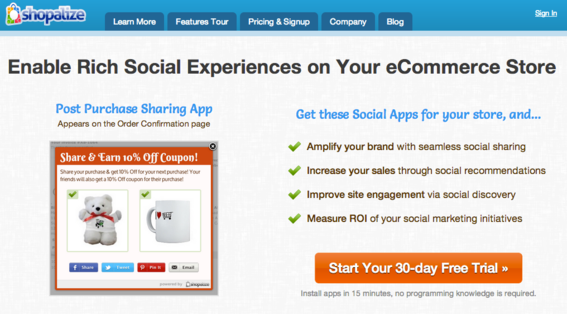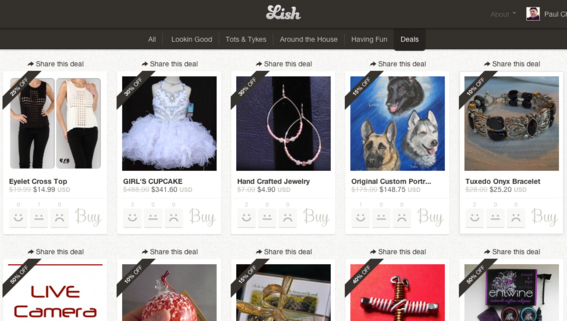Social media has inspired a new kind of shopping that is based on peer-to-peer sharing of content on sites like Pinterest, Etsy, or Shopcade, and less known sites such as LoveIt or Wanelo.
This consumer-driven trend is referred to as “discovery.” For many consumers, shopping is as much about product discovery as it is about buying. Discovery is based on the understanding that, though we may often know what we want to purchase, just as often we may not.
The real opportunity for merchants where social media is concerned is to aid in not just the “buying” aspect of shopping, but in “discovery,” as well. So, instead of just thinking how you can use social media to sell your products, think about how you can help people discover them.
With that in mind, here are five platforms and websites that you can use to assist shoppers with social discovery.
1. inSparq

inSparq provides three social discovery tools specifically for retailers.
inSparq offers a suite of three products that are designed to help retailers engage customers and, hopefully, grow sales. Each of the products is integrated into a merchant’s ecommerce site and include:
Social Sharing Widget. This allows shoppers to share products via Facebook, Twitter, Pinterest, SMS, and email. Merchants can offer incentives to encourage sharing and customize the widget to match the site’s look and feel.
Tell-A-Friend. This product enables consumers to invite their friends to sign up for a merchant’s site or mailing list using social channels.
Live Pinboard. This turns an ecommerce site into a Pinterest-like feed of trending products in real-time. According to inSparq, the feed is “curated through social actions of shoppers on the site — every share via social networks, purchase, and comment is aggregated in real-time on the feed.”
2. Shopalize

Shoplize is a social discovery platform that works with most shopping carts.
Shopalize provides a social commerce platform to help merchants increase social sharing and customer referrals from social media to their ecommerce stores.
The platform includes a post-purchase sharing plugin that appears on a store’s order confirmation page — i.e., after the customer checks out. Following a completed purchase, shoppers are prompted and rewarded for sharing their purchase with friends on Facebook or Twitter. When a customer shares, his or her friends can see it in their newsfeed, then click the link to visit the store.
Shopalize works with most major ecommerce platforms such as Magento, Shopify, AmeriCommerce, Volusion, Bigcommerce, and others.
3. Lish.com

Lish is a product discovery site from Payvment.
Unlike inSparq and Shopalize, which are social commerce platforms, Lish is a website that features products from retailers that use the Payvment in-Facebook shopping platform.
According to Payvment, Lish is “a new product discovery destination that lets you shop what’s trending on Facebook and Twitter.” Visitors to the site see a real-time feed of the most popular products listed by Payvment sellers.
4. Curisma

Curisma focuses on design and technology products.
Social shopping site Curisma calls itself a “social taste network” where people discover products shared by others with similar interests. The site is limited to products that feature the latest in technology and design. These include categories such home appliances, computer accessories, and products for do-it-yourselfers. Anyone can share products. Curisma welcomes retailers to participate, as well.
To get started, merchants create a profile where they can add a company logo, links to Facebook pages and Twitter accounts, as well as to their ecommerce website.
Curisma encourages retailers to share products from their own sites and from others — indicating that members who use the site purely for self-promotion rarely get followers. The site also recommends that, in addition to adding other products, merchants follow other users and participate in product discussions.
5. Albumstreet

Albumstreet enables merchants to create Pinterest-like albums called “streets.”
Albumstreet is not a place for sharing vintage LPs. In fact, the site covers a wide range of products including art, home decor, technology and travel.
Users create “streets,” which are collections of images curated in a Pinterest-like fashion. Registered members can browse other “streets” based on category, and then choose favorite products and add them to their own streets.
While not specifically designed for retailers, the site allows anyone to post product images, which link to the retailer’s site.
Benefits of Social Discovery
Social discovery provides merchants with the opportunity to enhance the retail experience for shoppers by helping them and their friends discover new products. Social discovery enables consumers to promote a brand in social networks, which can lead to increased traffic and sales based on word-of-mouth referrals. When incentives are added, it can also lead to repeat purchases.




